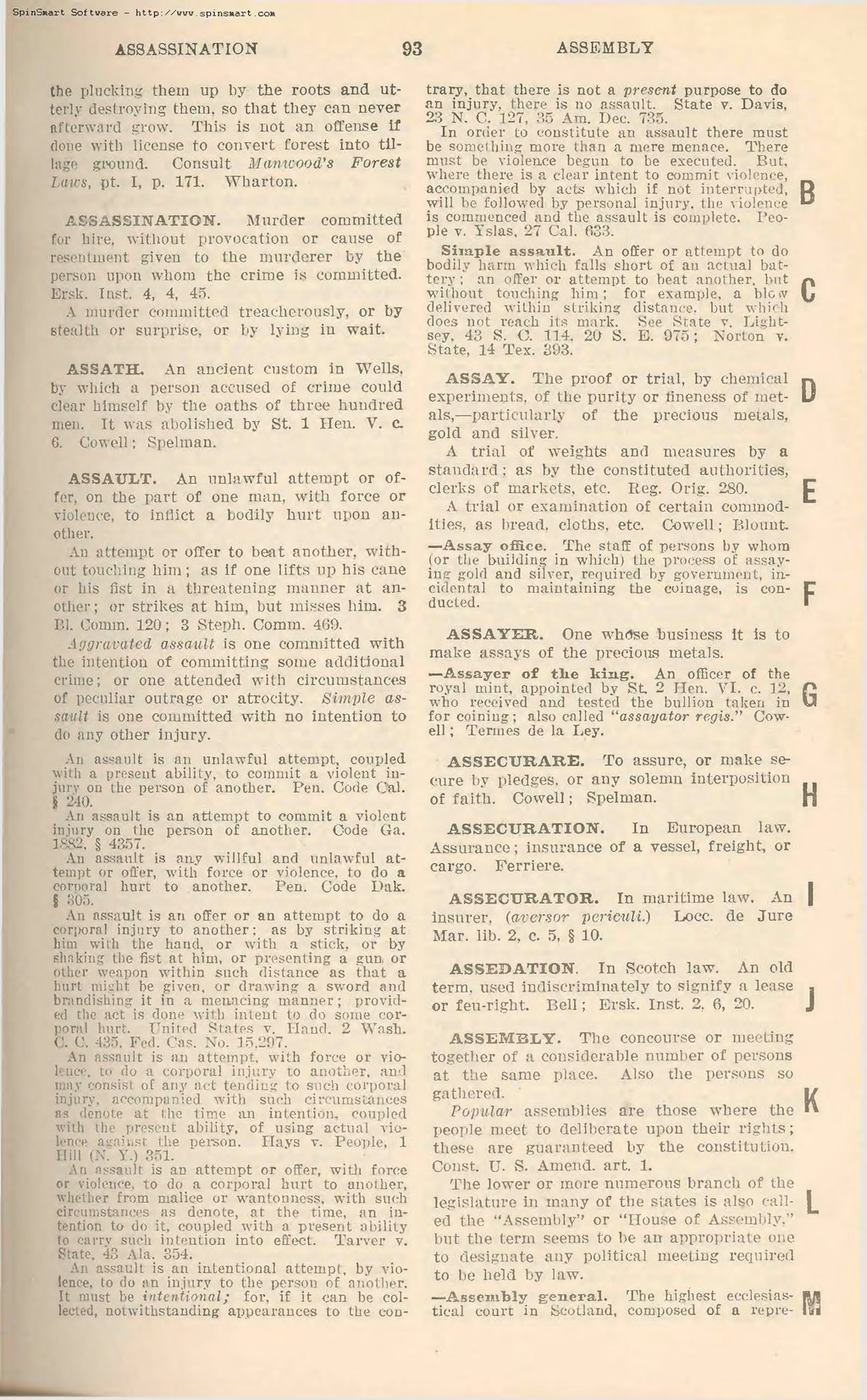the plucking them up by the roots and utterly destroying them. so that they can never utterly grow. This is not an offense if done with license to convert forest into tillage ground. Consult Manwood's Forest Laws, pt. I, p. 171. Wharton.
ASSASSINATION. Murder committed for hire, without provocation or cause of resentment given to the murderer by the person upon whom the crime is committed. Ersk. Inst. 4. 4, 45.
A murder committed treacherously, or by stealth or surprise, or by lying in wait.
ASSATH. An ancient custom in Wells. by which a person accused of crime could clear himself by the oaths of three hundred men. It was abolished by St. 1 Hen. V. c. 6. Cowell; Spelman
ASSAULT. An unlawful attempt or offer on the part of one man, with force or violence to inflict a bodily hurt upon another.
An attempt or offer to beat another, without touching him; as if one lifts up his cane or his flat in a threatening manner at another; or strikes at him, but misses him. 3 Bl. Comm. 120; 3 Steph. Comm. 469.
Aggravated assault is one committed with the intention of committing some addiitional crime; or one attended with circumstances or peculiar outrage or atrocity. Simple assault is one committed with no Intention to do any other Injury.
An assault is an unlawful attempt, coupled with a present ability. to commit a violent injury; on the person of another. Pen. Code Cal. § 249.
An assault is an attempt to commit a violent injury on the person of another. Code Ga. 1882, 4357.
An assault is any willful and unlawful attempt or offer, with force or violence. to do a coporal hurt to another. Pen. Code Dak. § 305.
An assault is an offer or an attempt to do a corporal injury to another: as by striking at him with the hand, or with a stick, or by striking the fist at him, or presenting a gun or other weapon within such distance as that a hurt might be given, or drawing a sword and brandishing it in a menacing manner; provided the act is done with intent to do some corporal hurt. United States v. Hand. 2 wash. C. C. 435., Fed Cas. No. 15,297.
An assault is an attempt with force or violence, to do a corporal injury to another, and may consist of any act tending to such corporal injury, accompanied with such circumstances as denote at the time an intention, coupled with the present ability, of using actual violence against person. Hays v. People. 1 Hill (N. Y.) 351.
An assault is an attempt or offer, with force or violence, to do a corporal hurt to another. whether from malice or wantonness, with such circumstances, as denote, at the time, an intention to do it, coupled with a present abilityto carry such as intention into effect. Tarver v. State, 43 Ala. 354.
An assault is an intentional attempt, by violence to do an injury to the person of another. It must be intentional; for, if it can be notwithstanding appearances to the contrary, that there is not a present purpose to do an injury, there is no assuult. State v. Davis. 23 N. C. 127. 35 Am. Dec. 735.
In order to constitute an assault there must be something more than a mere menace. There must be violence begun to be executed. But, where there is a clear intent to commit violence, accompanied by acts which it not interrupted. will be followed by personal injury, the violence is commenced and the assault is complete. People v. Yslas. 27 Cal. 633.
Simple assault. An offer or attempt to do bodily harm which falls short of an actual battery: an offer or attempt to beat another, but without touching him: for example, a blow delivered within striking distance, but which does not reach its mark. See State v. Lightsey. 43 S. C. 114. 20 S. E. 975; Norton v. State. 14 Tex. 393.
ASSAY. The proof or trial, by chemical experiments, of the purity or fineness of metals,—particularly of the precious metals, gold and silver.
A trial of weights and measures by a standard: as by the constituted authorities, clerks of markets. etc. Reg. Orig. 280.
A trial or examination of certain commoities, as bread. cloths. etc. Cowell; Blount.
—Asssay offfice. The stuff of persons by whom (or the building in which) the process of assaying gold and silver, required by government, incidental to maintaining the coinage, conducted.
ASSAYER. One whose business it is to make assays of the precious metals.
—Assayer of the king. An officer at the royal mint, appointed by St. 2 Hen. VI. c. 12. who received and tested the bullion taken in for coining: also culled "assayator regis." Cowell: Termes de in Ley.
ASSECURARE. To assure, or make secure by pledges, or any solemn interposition of faith Cowell; Spelman.
ASSECURATION. In European law. Assurance; insurance or a vessel. freight, or cargo. Ferriere.
ASSECURATOR. In maritime law. An insurer. (aversor periculi.) Locc. de Jure Mar. lib. 2. c. 5. 5 10.
ASSEDATION. In Scotch law. An old term. used indiscriminately to signify a lease or fen-right. Bell: Ersk. Inst. 2. 6, 20.
ASSEMBLY. The concourse or meeting together of a considerable number of persons at the same place. Also the persons so gathered.
Popular assemblies are those where the people meet to deliberate upon their rights; these are guaranteed by the constitution. Const. U. S. Amend. art. 1.
The lower or more numerous branch of the legislature in many of the states is also called the "Assembly" or "House of Assembly." but the term seems to be an appropriate one to designate any political meeting required to he held by law.
—Assembly general. The highest ecclesiastical court in Scotland. composed of a repre-
